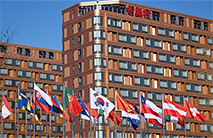Xi's view on civilization sheds light on shared future
BEIJING, Jan. 28 (Xinhua) -- With one week to go, athletes from around the world will gather at the Beijing 2022 Winter Olympics under the motto "Together for a Shared Future."
As the Beijing 2022 organizers explained, "Together" depicts how mankind stays strong when facing adversity and points out the solution to overcome those difficulties and create a better future, while "for a Shared Future" embodies a vision for a better life and conveys hope and confidence.
The motto echoes the concept of building a community with a shared future for mankind.
"Instead of riding separately in some 190 small boats, countries around the world should stay together in one giant ship and sail toward a brighter future, and this is why we came up with 'Together for a Shared Future' as the official motto for Beijing 2022," Chinese President Xi Jinping said when meeting International Olympic Committee chief Thomas Bach in Beijing on Tuesday.
China will make new and greater contributions to the Olympic Movement and promote the building of a community with a shared future for mankind, Xi said.
As athletes with various cultural backgrounds come to Beijing for competition and exchanges in ice and snow sports, they also participate in the event to show solidarity.
Mankind is in an era of major development as well as profound transformation and change, and is also in an era of numerous challenges and increasing risks. Unity, cooperation, and dialogue clamor in the face of global challenges, particularly COVID-19 claiming millions of lives across the globe.
Official figures show China has provided more than 2 billion doses of COVID vaccines to over 120 countries and international organizations as of Dec. 26, 2021, becoming the biggest provider of outbound vaccines among all nations.
In April 2020, when the COVID-19 situation in Uzbekistan worsened, the Chinese government immediately sent a medical team to assist in the local fight against the virus.
Upon hearing the news, Kenjebaev Murodjon immediately traveled over 100 km to Tashkent, Uzbekistan's capital, and volunteered as an interpreter for the Chinese medical team.
The Uzbek studied in China's Guangdong Province in 2014 and later married a Chinese woman.
"I'm deeply moved and impressed by the professionalism of Chinese medics, who unselfishly shared their anti-virus experiences," said Murodjon, adding that the fight against COVID-19 has brought the two countries even closer.
With an ardent passion for traditional Chinese culture, Murodjon and his wife started a class in February 2020 to teach locals Chinese for free, the first of its kind in Gulistan, his home city.
"Now studying Chinese has become a new trend among local Uzbek youngsters boosted by the Belt and Road Initiative (BRI)," he said.
The BRI, proposed by Xi in 2013, aims to achieve policy, infrastructure, trade, financial and people-to-people connectivity along and beyond the ancient Silk Road trade routes.
So far, 147 countries and 32 international organizations have signed more than 200 cooperation documents with China under this framework. It has become a paradigm of civilization diversity and collective prosperity under the principles of extensive consultation, joint contribution and shared benefits.
"Diversity spurs interaction among civilizations, which in turn promotes mutual learning and their further development," said Xi in May 2019 at the opening ceremony of the Conference on Dialogue of Asian Civilizations in Beijing.
"We need to promote exchanges and mutual learning among countries, nations and cultures around the world, and strengthen popular support for jointly building a community with a shared future for both Asia and humanity as a whole," Xi added.
Photos
Related Stories
Copyright © 2022 People's Daily Online. All Rights Reserved.










